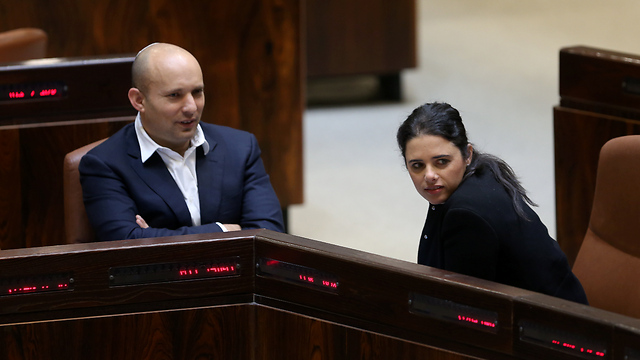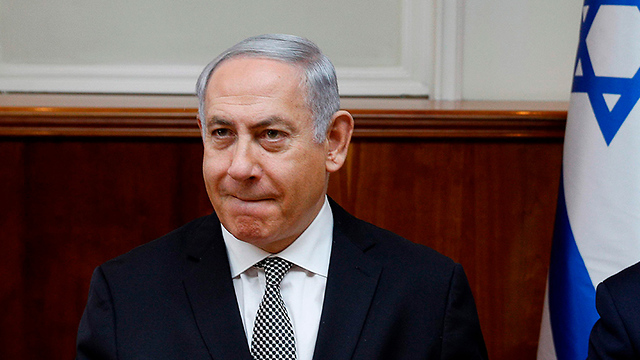
Who stands to gain and who stands to lose from early elections?
Analysis: Prime Minister Netanyahu has issued a clear ultimatum to his coalition partners, but knows elections in the midst of a legal imbroglio aren’t necessarily in his favor; UTJ members are at odds over going to elections, Finance Minister Kahlon needs more time to complete the reforms he is working on, and Bayit Yehudi will likely lose its current achievements in a future coalition.
Seemingly, none of the coalition partners are interested in elections. In practice, however, things are different and complex.
Who is interested in elections? Who stands to lose from a dissolution of the coalition? And the members of which party are at odds over the issue?

Likud
Some party members are advising Netanyahu to take advantage of the positive momentum that has been created and call elections, as large parts of the public believe the prime minister is being persecuted by the law enforcement authorities and the media.
Other voices in Likud are warning, however, that going to elections in the midst of a legal imbroglio is an adventure that could end badly as far as Netanyahu is concerned.
The prime minister came up with the following formula Tuesday evening: A government that would complete its term until November 2019—with an explicit commitment from all partners—or elections.
“There is no point in the government dismantling in May. Therefore, without an agreement that ensures the government's continued life span, there is no choice but to go to elections,” said a senior source in the coalition.
United Torah Judaism
The ultra-Orthodox Knesset members, who started the crisis with their refusal to approve the 2019 state budget before the amendment to the draft law is approved, have two different opinions on the matter.
Members of the Degel HaTorah faction—Moshe Gafni, Uri Maklev and Ya'akov Asher—want to reach a solution, are not interested in elections and may even settle for the amendment passing the ministerial committee and its first reading.

The other half of the party—Deputy Health Minister Yaakov Litzman and members of the Ger Hasidic sect—have adopted a more aggressive approach. At the Ger Rebbe’s orders, Litzman is demanding that the law pass its three readings before the vote on the budget.
While UTJ isn’t interested in elections, polls show the party isn’t expected to face any dramatic changes among its electorate. The risk UTJ would be taking is that the elections would be followed by the formation of a government without Haredim, there would be no draft law and the party would lose its current influence and power.
Kulanu
Finance Minister Moshe Kahlon put an ultimatum on the table, making it clear that he would not oppose elections if the budget isn’t approved.
“I won’t be able to remain finance minister if the budget isn’t passed by the end of the Knesset session. The IDF draft has nothing to do with the state budget,” he said, warning that “the people of Israel will sit down for the Passover Seder with a budget or without a finance minister.”
In practice, however, Kahlon needs more time to complete the reforms he is working on and push for a further drop in housing prices.
Yisrael Beytenu
Defense Minister Avigdor Lieberman isn’t willing to give in to the Haredim, knowing he may pay a heavy public price for doing so. While he isn’t eager to give up his prestigious portfolio, possible election dynamics won’t leave him indifferent. In case of elections, Lieberman will explain to his voters that he gave up a key position in favor of an important principle—equality in drafting.
Bayit Yehudi
The religious Zionist party will find it very difficult to regain its current achievements after the elections: The Education portfolio (held by party leader Naftali Bennett), the prestigious Justice portfolio (held by Ayelet Shaked), two representatives in the Political-Security Cabinet and full control of the Knesset’s Constitution Committee (which is chaired by MK Nissan Slomiansky)

And like in the 2015 elections, Bennett’s party will be most affected by a public momentum in favor of Netanyahu.
Shas
The Haredi party’s voice hasn’t been heard throughout the crisis. The polls don’t bode well for Interior Minister Aryeh Deri, and his legal trouble is affecting the party’s general situation as well.
Although Deri keeps fighting for Torah studies, his serious fear of elections has led to the adoption of a more compromising approach.












